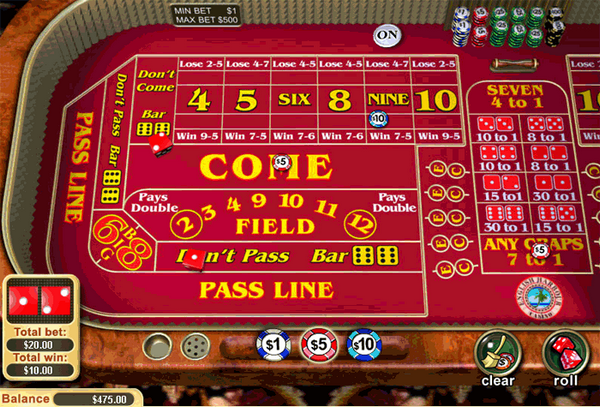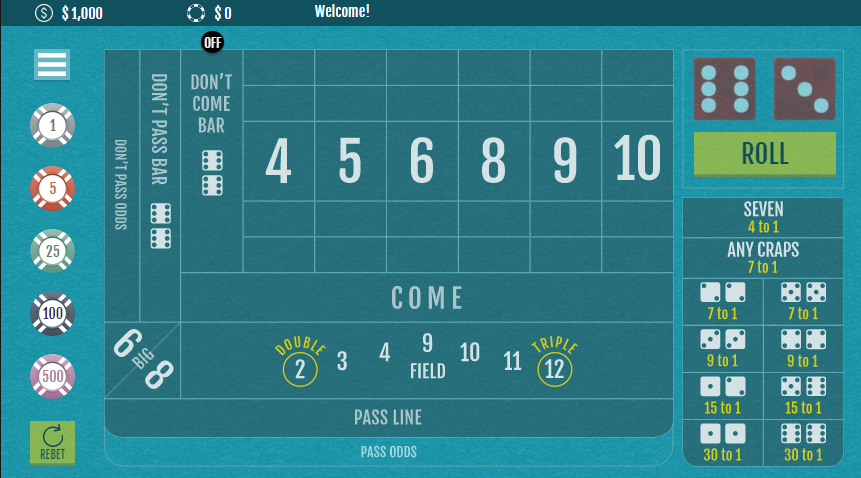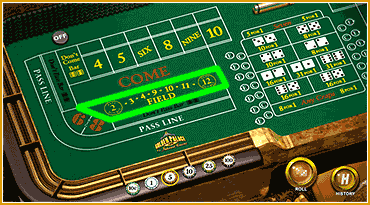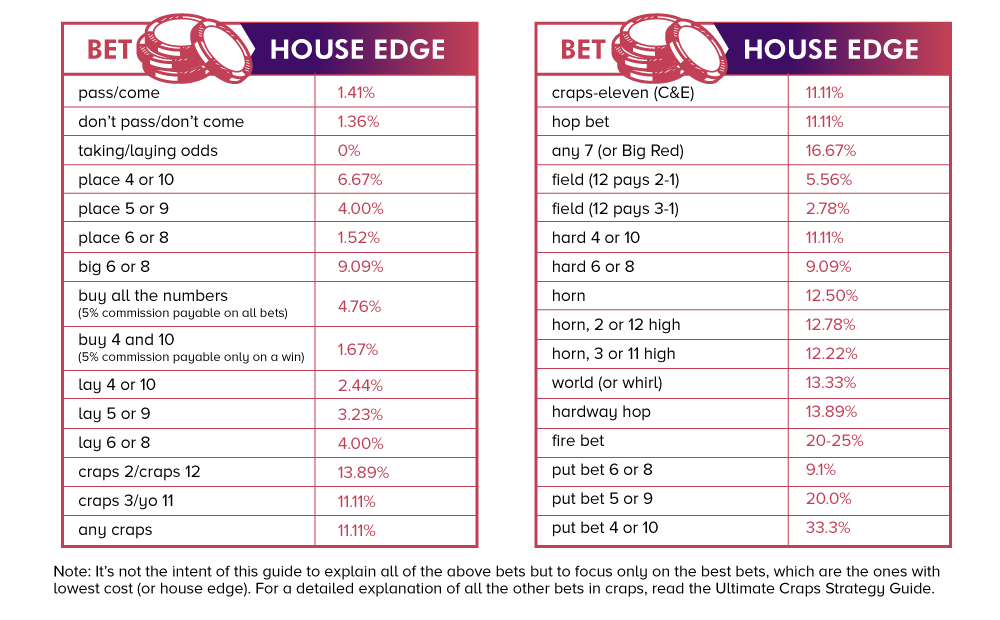House Edge Craps Field Bet
Overall, the house edge is 5.56% on the field bet. The house edge can be as low as 2.78% if the casino is enforcing the 3:1 payouts, which is actually nearly twice as good for the player since they will not lose as much money over the long run. The field bet is known as a 'self-service' type of bet. The house edge on the 6 or 8 is 1.52% which isn’t much worse than the pass/don’t pass or come/don’t come wagers. The house edge on the Place 5 or 9 is 4.00% while the house edge on the 4 or 10 is 6.67%. This bet is a winner of the next roll is a 2,3,4,9,10,11 or 12. (A hedge bet is one or more bets intended to protect another bet, in this case the $1 craps check.) To him, it’s worth a $1 investment against the $10 Pass bet in case the shooter rolls a 2, 3, or 12 on the come-out roll. (We’ll learn about all the bets and craps lingo, such as “come-out roll,” in other articles.).
Thread Rating:

Likewise, always placing a field bet when you bet the hardways will lower the house edge.
certainly not! but perhaps the variance
Likewise, always placing a field bet when you bet the hardways will lower the house edge.
A good example of what I'm talking about - if you combine a hardway and a field bet, you do lower the combined house edge, since a field bet has a lower edge than a hardway, but you ADD to your expected loss, not subtract from it.
Cheers,
Alan Shank
Woodland, Ca
Great site & especially love the Wizard of Odds site - I use the basics to impress my friends with my knowledge of probability & refer them to it when they ask me questions too hard for me to answer.
I've recently started playing craps. I bet pass line with full odds, and once the point is set, I bet the come with full odds when that new point is set & continue doing this until I crap out. (The tax professor who taught me craps calls this 'turbo craps')
The question I have is this: Ordinarily, after an original pass line point is made, the odds on my come bets are not 'working' until a new point is established. However, I can tell the dealer that I want my odds 'working.'
My assumption is that since the casino default is that the odds are not working, it's to my advantage to have them working.
Is that correct? Does it matter how many come bets I have up at the time?
Thanks for your thoughts.
Well IMO its just a matter of how large your bankroll is. The house advantage on your come bet once placed on a point or a 'put bet' is not going to ever change whether or not your odds are working. Lets assume you have a $5 come bet that moves to the 10 and you place 10X's odds on it ($50) then your pass line point is made. And you are now on a new come out roll. What you need to ask yourself is.......Do I want to risk $5 at a 33.33% house edge or $55 dollars at a 3.03% house edge?
Off topic: I used to pay with a guy at a casino that had 10x odds, and he would play what I like to call 'super turbo craps' LOL It was a $1 table. He would place a $1 pass line bet. Once the pass line point was established he would place $10 odds on it. Then he would make a $1 'put bet' with 10X's odd on every other number and a $1 come bet. One night he made 11 passes in a row with 80 plus rolls before '7ing out' and he always had his odds working on the come out. Needless to say the guy had a HUGE night!
A good example of what I'm talking about - if you combine a hardway and a field bet, you do lower the combined house edge, since a field bet has a lower edge than a hardway, but you ADD to your expected loss, not subtract from it.
Cheers,
Alan Shank
Woodland, Ca
Ah. I stand corrected. At least we agree a player is not accomplishing what he wants.
You could play pass line/full odds, one come bet/full odds, and a don't come bet/full odds. If you are lucky and they hit in the right order you will win the come bets before you 7 out. It will reduce your variance a little.
I often try this, usually for 2comebets or 3comebets and then switching to the DontCome. It always seems to annoy the dealers for some reason.
/GettyImages-889673-001-1--583f947f5f9b5851e57e133c.jpg)
I usually have my odds working on ComeOut rolls but often this doesn't work out too well for me.
This is assuming the last point was made.
So, you've got all your odds working and the guy rolls a 7. It sucks to be you!
Remember, the 7 comes up more than any other number.
Odds working on the Come Out you just lose your odds and original bet if the shooter rolls a 7.
This is assuming the last point was made.
So, you've got all your odds working and the guy rolls a 7. It sucks to be you!
Remember, the 7 comes up more than any other number.
This is no different than having your odds working when it's not the pass comeout. If you want to bet odds, why not have them working?
It's the pass comeout, and you have a come bet behind the four, with working odds. The shooter rolls a four. You win your come and and 2-to-1 odds. It's great to be you!
If you think there's any difference between the pass comeout roll and any other roll, you're confused.
Cheers,
Alan Shank
Woodland, CA

Since the odds have a zero expectation, there is no mathematical reason to have them not working - or working, for that matter.
According to the Wizard, Come Odds should always be left on, since the Come bet itself cannot be turned off. He elsewhere once gave an example of a Come bet up on 5 with maximum Odds behind it increasing the overall house edge by 0.377% by turning the Odds off through come-out.
According to the Wizard, Come Odds should always be left on, since the Come bet itself cannot be turned off. He elsewhere once gave an example of a Come bet up on 5 with maximum Odds behind it increasing the overall house edge by 0.377% by turning the Odds off through come-out.
To perfectly grasp why the Wizard likes free odds at all, you have to understand that he is framing the use of it in the context of the amount of action the player wants. In other words, if you are at a $25 min table and that *is* also the size bet you are comfortable with, IMO Michael would not say to that gambler to use free odds to try to increase how much he will win.
At a $5 min table, it would pain him [and most of us] to see the same player place that same $25 bet on the passline with no free odds.

....[A]lways placing a Field bet when you bet the hardways will lower the house edge.
Hardways 2&2 (or 5&5) with a Triple-12 Field: (-1*8 + 7*1 + 2*1 + 3*1 + 1*14 - 1*20)/(9 + 36) = -4.2553% (v. -6.3830% with a Double-12 Field).
Hardways 3&3 (or 4&4) with a Triple-12 Field: (-1*10 + 9*1 + 2*1 + 3*1 + 1*14 - 1*20)/(11+36) = -4.0816% (v. -6.1224%).
Per-roll for Hardways 2&2/5&5 + T12 Field: (2*1 + 3*1 + 1*14 - 1*20 + 7*1 - 1*8 + 0*27)/(2*36) = -2.7778% (v. -4.1667%).
Per-roll for Hardways 3&3/4&4 + T12 Field: (2*1 + 3*1 + 1*14 - 1*20 + 9*1 - 1*10 + 0*25)/(2*36) = -2.7778% (v. -4.1667%).
- Page 3 of 13
Introduction
One argument that comes up a lot is how to quantify the house edge in craps. Normally the house edge is defined as the ratio of expected loss to the initial bet. However, how do you treat bets, like the place bet for example, when many rolls may be required to resolve the bet and the player can take it down anytime? Is it a push or should we assume the bet will stay on the table until resolved?
House Edge Craps Field Bets
Personally, I prefer to define the house edge in craps on a 'per bet resolved' basis. However, for those who disagree, I present this page, which defines the house edge all three ways.
Multi-Roll Bets
The following table shows the house edge of all the bets in craps which may take multiple rolls to resolve. The house edge is shown three ways: per bet made, per bet resolved, and per roll.
Craps House Edge
| Bet | Pays | Expected Rolls | House Edge Per Bet Made | House Edge Per Bet Resolved | House Edge Per Roll |
|---|---|---|---|---|---|
| Pass | 1 to 1 | 3.38 | 1.41% | 1.41% | 0.42% |
| Don't Pass | 1 to 1 | 3.47 | 1.36% | 1.40% | 0.40% |
| Taking Odds 6 and 8 | 6 to 5 | 3.27 | 0.00% | 0.00% | 0.00% |
| Taking Odds 5 and 9 | 3 to 2 | 3.60 | 0.00% | 0.00% | 0.00% |
| Taking Odds 4 and 10 | 2 to 1 | 4.00 | 0.00% | 0.00% | 0.00% |
| Laying Odds 6 and 8 | 5 to 6 | 3.27 | 0.00% | 0.00% | 0.00% |
| Laying Odds 5 and 9 | 2 to 3 | 3.60 | 0.00% | 0.00% | 0.00% |
| Laying Odds 4 and 10 | 1 to 2 | 4.00 | 0.00% | 0.00% | 0.00% |
| Place 6 and 8 | 7 to 6 | 3.27 | 0.46% | 1.52% | 0.46% |
| Place 5 and 9 | 7 to 5 | 3.60 | 1.11% | 4.00% | 1.11% |
| Place 4 and 10 | 9 to 5 | 4.00 | 1.67% | 6.67% | 1.67% |
| Big 6 and 8 | 1 to 1 | 3.27 | 2.78% | 9.09% | 2.78% |
| Don't Place 6 and 8 | 4 to 5 | 3.27 | 0.56% | 1.82% | 0.56% |
| Don't Place 5 and 9 | 5 to 8 | 3.60 | 0.69% | 2.50% | 0.69% |
| Don't Place 4 and 10 | 5 to 11 | 4.00 | 0.76% | 3.03% | 0.76% |
| Buy 6 and 8 * | 23 to 21 | 3.27 | 1.46% | 4.76% | 1.46% |
| Buy 5 and 9 * | 29 to 21 | 3.60 | 1.32% | 4.76% | 1.32% |
| Buy 4 and 10 * | 39 to 21 | 4.00 | 1.19% | 4.76% | 1.19% |
| Buy 6 and 8 ** | 23 to 20 | 3.27 | 0.69% | 2.27% | 0.69% |
| Buy 5 and 9 ** | 29 to 20 | 3.60 | 0.56% | 2.00% | 0.56% |
| Buy 4 and 10 ** | 39 to 20 | 4.00 | 0.42% | 1.67% | 0.42% |
| Lay 6 and 8 * | 19 to 25 | 3.27 | 1.22% | 4.00% | 1.22% |
| Lay 5 and 9 * | 19 to 31 | 3.60 | 0.90% | 3.23% | 0.90% |
| Lay 4 and 10 * | 19 to 41 | 4.00 | 0.61% | 2.44% | 0.61% |
| Lay 6 and 8 ** | 19 to 24 | 3.27 | 0.69% | 2.27% | 0.69% |
| Lay 5 and 9 ** | 19 to 30 | 3.60 | 0.56% | 2.00% | 0.56% |
| Lay 4 and 10 ** | 19 to 40 | 4.00 | 0.42% | 1.67% | 0.42% |
| Hard 6 and 8 (US) | 9 to 1 | 3.27 | 2.78% | 9.09% | 2.78% |
| Hard 6 and 8 (AU) | 19 to 2 | 3.60 | 1.39% | 4.55% | 1.26% |
| Hard 4 and 10 (US) | 7 to 1 | 4.00 | 2.78% | 11.11% | 2.78% |
| Hard 4 and 10 (AU) | 15 to 2 | 4.00 | 1.39% | 5.56% | 1.39% |
Footnotes:
* Commission always paid
** Commission on win only
AU Australia rules
US United States rules
Let me add two more things, based on frequent reader comments:
- Some of these bets may not exist anywhere on earth. For example, I've never seen a casino with buy bets on a 5, 6, 8, and 9 where the commission was payable on a win only. Nevertheless, I don't know the rules of every craps table on earth. I also know that if I omit such bets, somebody will write in and take me to task for the omission.
- The table above assumes wins are calculated exactly. In other words, no rounding up or down. Let me make it perfectly clear that you can lower the house edge if the dealers will round a win up or a commission down. A common one is a 5% commission on a $25 bet is $1.25. If the casino rounds that down to $1, then that cuts the commission to 4%. Finding other situations is an exercise left up to the reader.
Single-Roll Bets
The following table shows the house edge of all the bets in craps which are always resolved in a single roll, except the field. Thus, there can be only one way to define the house edge.
Craps House Edge
| Bet | Pays | Probability Win | House Edge |
|---|---|---|---|
| 2, 12, and all 'hard' hop bets | 33 | 2.78% | 5.56% |
| 2, 12, and all 'hard' hop bets | 32 | 2.78% | 8.33% |
| 2, 12, and all 'hard' hop bets | 31 | 2.78% | 11.11% |
| 2, 12, and all 'hard' hop bets | 30 | 2.78% | 13.89% |
| 2, 12, and all 'hard' hop bets | 29 | 2.78% | 16.67% |
| 3, 11, and all 'easy' hop bets | 16 | 5.56% | 5.56% |
| 3, 11, and all 'easy' hop bets | 15 | 5.56% | 11.11% |
| 3, 11, and all 'easy' hop bets | 14 | 5.56% | 16.67% |
| Any craps (2, 3, or 12) | 7 | 11.11% | 11.11% |
| Any craps (2, 3, or 12) | 7.5 | 11.11% | 5.56% |
| Any seven (US) | 4 | 16.67% | 16.67% |
| Any seven (AU) | 4.5 | 16.67% | 8.33% |

House Edge Craps Field Betting
Field
- If the field bet pays 2 to 1 on both the 2 and 12, then the house edge is 5.56%.
- If the field bet pays 2 to 1 on the 2 and 3 to 1 on the 12, then the house edge is 2.78%.
- If the field bet pays 3 to 1 on the 2 and 2 to 1 on the 12, then the house edge is 2.78%.
- If the field bet pays 3 to 1 on both the 2 and 12, then the house edge is 0.00%.
Internal Links
- How the house edge for each bet is derived, in brief.
- The house edge of all the major bets on both a per-bet made and per-roll basis
- Dice Control Experiments. The results of two experiments on skillful dice throwing.
- Dice Control Advantage. The player advantage, assuming he can influence the dice.
- Craps variants. Alternative rules and bets such as the Fire Bet, Crapless Craps, and Card Craps.
- California craps. How craps is played in California using playing cards.
- Play Craps. Craps game using cards at the Viejas casino in San Diego.
- Number of Rolls Table. Probability of a shooter lasting 1 to 200 rolls before a seven-out.
- Ask the Wizard. See craps questions I've answered about:
- Simple Craps game. My simple Java craps game.
Written by: Michael Shackleford